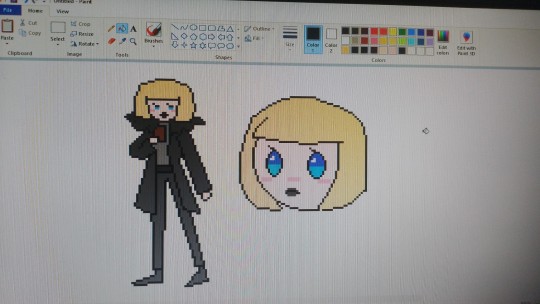#Also sorry if this isn't as good as my usual art drawing with a mouse is difficult 😭
Explore tagged Tumblr posts
Text

Drew Mello in MS paint during class
#Death Note#Mihael Keehl#Death note fanart#My art#Before I got my phone#MS paint was my FAVORITE art program!#I told all my friends use it#And would constantly draw in MS paint with a mouse and no undo lmao#I still love MS paint <3#Also sorry if this isn't as good as my usual art drawing with a mouse is difficult 😭#ms paint
17 notes
·
View notes
Note
Hi! So I'm very excited about entering my undergrad of translation, and I just wanted to know if you had any tips or resources (textbooks?) you could recommend to get a bit ahead? More specifically, about translating poetry or lyrics of songs, because I love it, but I'm so horrible at it and would love to get better at it over the summer! (but I understand if this isn't possible, I love you and your blog either way!)
Oh, congrats on getting into the programme, I’m so excited for you! Of course I’ll give you a few resources. If you haven’t started translation theory yet, some of these might be a little too complex, but at the very least you can keep them tucked somewhere for when you need to go deeper on a given subject.
As you’ll find out soon enough, there’s usually a bit of a dichotomy between translation theory and translation practice; people bicker and shake fists; it’s all about bespectacled nerds (the scholars) feeling attacked by the jocks (the translators) and vice-versa. But the best really is to hone both—write translation, think about it, read about it. Textual and creative awareness are key, as is experiencing the text for yourself, especially with music and poetry, you know? You want to become aware of and attuned to what you’re translating, how you’re translating, and why you’re choosing to translate something as such.
First things first, you can get your hands on Francis R. Jones’ introductory article on Poetry in Translation, which presents the practice itself and the most important challenges and criticism debates on the subject. Kate Briggs’ This Little Art will painlessly introduce you to the practice and subjective experience of literary translation. A little more general, but a very good and fairly simple introduction to translation as creation is Umberto Eco’s Mouse or Rat? Translation as Negotiation, which, if you’re feeling zealous, you can pair with his The Limits of Interpretation (this one’s more difficult, less chatty, and about semiotics rather than translation studies). Another very good book about stylistic devices and effects in poetry is Adrian Pilkington’s Poetic Effects (but like, go to your university library, ‘cause that pricing is outrageous). Again, this is not translation-focused, but it does help creating a web of references you’ll need to analyse your source-text and write your target-text. Ezra Pound touches upon poetry, relay-poetry, and poetry in translation in his collection of essays Make it New. And then there’s Willis Barnstone (famed translator of Sappho!)’s The Poetics of Translation: History, Theory, Practice, which should give you a very thorough overview.
Two of my favourites and constant companions are:
Jean Boase-Beier’s Stylistic Approaches to Translation, which focuses on how to interpret and use style in order to translate literary texts (particularly poetry), and most importantly why it’s a nourishment rather than a loss from source-text to target text.
And Barbara Folkart’s Second Finding: Poetics of Translation, which is interested in describing poetry translation as viable practice and argues for the creation of a “new” (derived) poem in translation, an echo of the source-text.
These are definitely a little advanced, though, so I would wait to have a bit of a translational overview before getting to them. You’ll draw more from them with more general knowledge that you might have at this stage.
Short and sweet but food for thoughts on the subject:
Priya Sarukkai Chabria’s interview on her translation of Andal’s religious hymns. Her introduction to Andal: Autobiography of A Goddess is also informative and fascinating.
Emily Wilson’s interview on translation and languages and her introduction to her translation of the Odyssey
Martyn Crucefix’s interview on his translation of Rilke’s Sonnets to Orpheus
Lawrence Venuti’s article Introduction to Poetry and Translation (I don’t like Venuti but it’s good to have different points of view in order to understand a concept fully).
Theo Hermans’ (a babe) article Translation between Poetics and Ideology and everything he writes, really
Roland Barthes’ article Death of the Author (sorry I’m pushing my own agenda at this point)
On translation and music, I’m far less knowledgeable but I really advise you too look into Şebnem Susam-Saraeva (whom I love)’s works. Among others, you’ll find lots of good references in her Translation and Music: a Bibliography and more on the subject in her Translation and Music: Changing Perspectives, Frameworks and Significance, and more recently Translation and Music and finally, at least the introduction in her book Translation and Popular Music: Transcultural Intimacy in Turkish-Greek relations.
These, of course, are all theory-based works. As I said, combining theory and practice is the best you can do, in my opinion. Nourish your knowledge with experience. Theory will give you tools and shed light on your processes, but—if you’re feeling like you’re horrible at something (which I’m sure you’re not: at worst, just new to the exercise), just try your hand at it. You’re still free of the constraints of grading and scholarly pressure, so choose a poem or a song you love and translate it freely. Do what you want with it, try things out, allow yourself one, two, three drafts, write several versions and keep them all. Adapt, rewrite, create something new.
I hope this helps. Have the most fun and don’t hesitate to write if you need more references!
160 notes
·
View notes